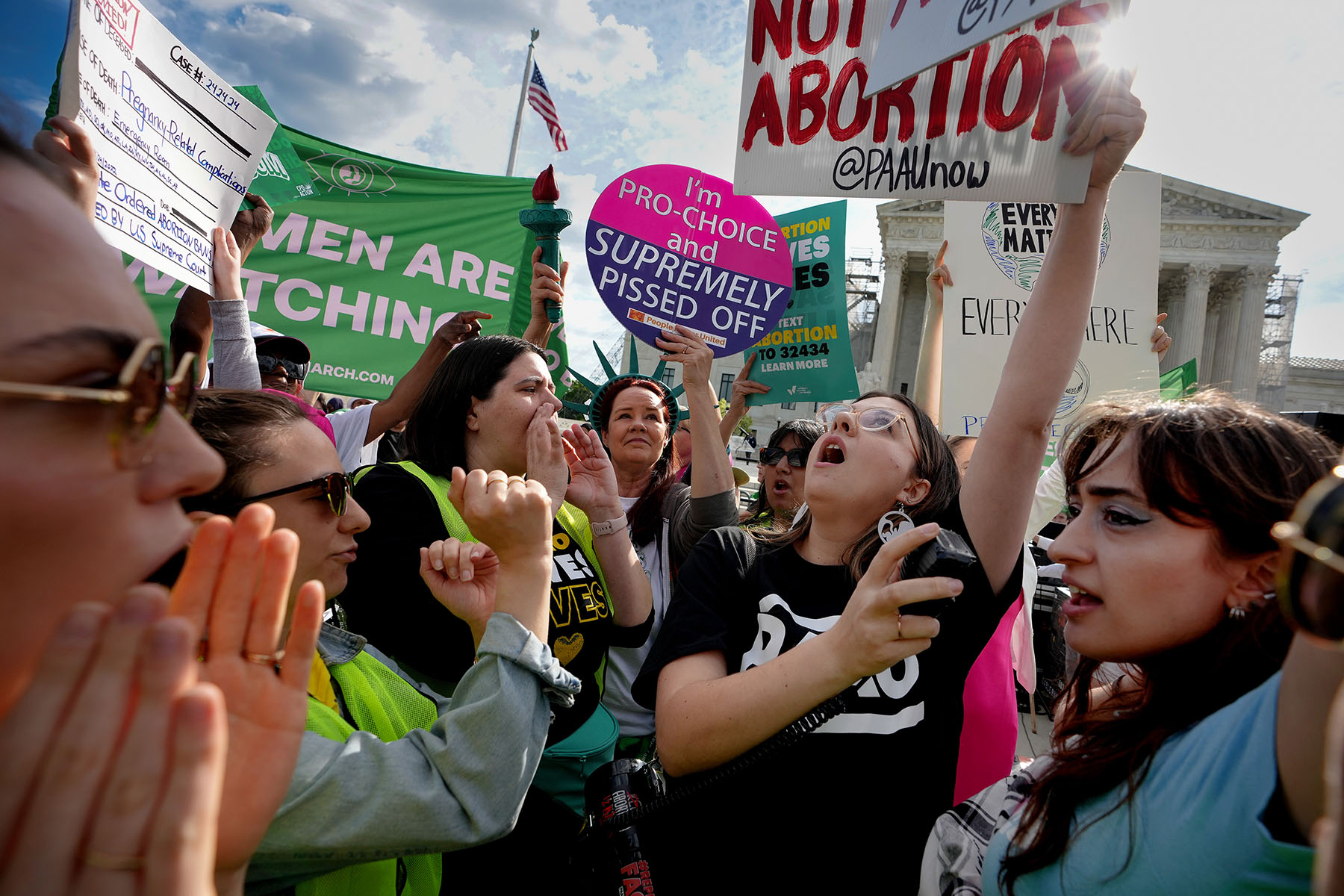The Supreme Court appeared split Wednesday in a case over whether a federal law requiring hospitals to provide appropriate stabilizing medical treatment for patients could in some cases overrule a state’s abortion ban — a question with tremendous implications for pregnant patients’ ability to access emergency health care.
The case, Idaho v. United States, concerns enforcement of the Emergency Medical Treatment and Labor Act, known as EMTALA, in instances when it could conflict with individual state abortion bans. Passed in 1986, the law requires that hospitals with emergency departments that participate in Medicare — the vast majority of hospitals — screen patients and provide them with appropriate stabilizing medical care, regardless of their ability to pay. That care can include abortion, which is in some cases deemed the medically appropriate care for a health emergency.
The Department of Justice has cited EMTALA to partially challenge Idaho’s near-total abortion ban, passed in 2020 and activated after the Supreme Court overturned Roe v. Wade in the 2022 case Dobbs v. Jackson Women’s Health Organization. Idaho’s law, one of the nation’s strictest, includes a very narrow list of exceptions, allowing abortion only when a pregnancy is the result of rape or incest, when termination is necessary to save the pregnant person’s life, or when it is ectopic (outside the uterus) or molar (when tumors form instead of a placenta). It does not allow an exception if staying pregnant otherwise threatens someone’s health.
The Justice Department’s argument has argued that in medical emergencies where abortion is the appropriate stabilizing treatment, the federal law must trump Idaho’s ban. But Idaho has argued that the state’s law should supersede EMTALA because the federal law doesn’t mention abortion by name. EMTALA does not explicitly state which medical procedures physicians should provide.
The case marks the high court’s second abortion-related challenge this term, following a March hearing on abortion drug mifepristone. Its implications are relatively narrow — the vast majority of abortions performed are not for medical emergencies, and would not be protected under EMTALA regardless.
Still, the case underscores just how strict state abortion bans have become, and the risks they pose to pregnant Americans’ health. Dozens of EMTALA-based complaints have been filed against hospitals in states with abortion bans, where patients say they were turned away while experiencing pregnancy-related medical emergencies. Weakening the federal law could also limit pregnant patients’ avenues for legal recourse should they seek to pursue it.
A large share of questioning during Wednesday’s oral arguments came from the court’s four woman justices — liberals Ketanji Brown Jackson, Elena Kagan, Sonia Sotomayor and conservative Amy Coney Barrett — who all voiced skepticism toward Idaho’s position, noting that without EMTALA’s protections, physicians in Idaho could face legal jeopardy for providing abortions needed to avert medical crises that could significantly threaten a patient’s health.
“The medically accepted obligation of doctors when they have women with certain conditions that may not result in death, but more than likely will result in very serious medical conditions — including blindness for some, for others, the loss of organs for some chronic blood strokes — Idaho is saying unless the doctor can say in good faith that this person’s death is likely, as opposed to serious illness, you can’t perform the abortion,” Sotomayor said.
Coney Barrett at one point suggested that Idaho had little reason to challenge the federal government’s EMTALA enforcement. “Why are you here?” she asked Josh Turner, the attorney representing the state.
While focused on one state, the ruling will have implications across the country. A decision upholding Idaho’s ban in full — and finding that EMTALA does not preserve the right to an abortion under emergency medical circumstances — could encourage states with similarly restrictive bans to ignore the federal emergency care protection. Arkansas, Oklahoma and South Dakota, which all enforce near-total bans, also do not have exceptions for the health of the pregnant person.
“if Idaho is allowed to excise emergency abortions from EMTALA … any state with a ban can turn around and will know its excision is unchallengeable,” said Sara Rosenbaum, a professor emerita of health law and policy at George Washington University who has written extensively about the federal health law. Rosenbaum has signed onto an amicus brief encouraging the court to rule in favor of the federal government.
A victory for Idaho could have even deeper implications, she argued, such as discouraging emergency room staff in states with strict bans from caring for pregnant patients, even if their pregnancy is incidental to their medical concern. And it could offer a road map for states to implement other laws that limit access to health care — for instance, outlawing certain types of medical care for patients with HIV or substance use disorders.
“The basis of Dobbs is states have the power to regulate medical care. If you extend that to EMTALA, you open up EMTALA to whatever drama a state wants to play out in its emergency rooms,” Rosenbaum said.
-
Read Next:
The case has drawn concern from health care providers across the country. Two dozen medical associations, including major professional groups for OB/GYNS, emergency physicians and maternal-fetal medicine doctors, put out a statement late Tuesday night encouraging the court to find in the Department of Justice’s favor.
“EMTALA should guarantee that patients experiencing pregnancy complications in the emergency setting are able to get evidence-based care, which includes being counseled fairly and honestly and receiving an abortion if that is the intervention that they need for their health emergency,” the statement read. “Without comprehensive EMTALA protections, the lives of pregnant patients will most certainly be at risk.”
The court is expected to rule sometime before the end of June. While the case is being decided, the Supreme Court has blocked enforcement of EMTALA in Idaho as it relates to requiring abortion. That’s had significant consequences. Already, close to a quarter of the state’s OBGYNs have left, citing at least in part the fear of violating Idaho’s abortion laws. Three hospital obstetrics wards have closed entirely, leaving patients with fewer options.
Pregnant people facing dangerous medical complications are already struggling to access medical care. Stacy Seyb, a maternal-fetal medicine specialist in Boise, said he has seen pregnant patients, including those who have become septic, transferred out of the state to get abortions that Idaho hospitals currently aren’t able to provide. He estimates that as often as twice a month, patients are flown to Salt Lake City, the closest option for a legal abortion. It’s an hour-long flight, or five hours driving – time in which their condition could worsen.
He fears the status quo isn’t sustainable, and that patients’ health will suffer.
“Patients should be able to get the care they need close to their homes, where their families are and without a bunch of extra hoops to jump through, as well as trauma around going to another city,” he said. “This can’t go on forever, can it? It doesn’t make sense.”








